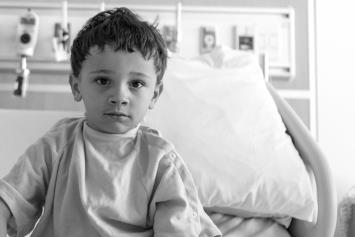
Coping With Colorectal and Bowel Management Issues
Coping with a chronic colorectal condition can be difficult, but there are common tips and resources for children and families to find a system that works best.
About Your CCPR Visit

Colorectal Assessment Tools: Creating a Plan for Your Child's Care
Colorectal patients often need to have testing completed to help the providers make decisions and come up with the best treatment plan for the individual.

The Colorectal Team: Bringing Together Different Specialties to Treat Your Child
The team works together with your family to meet your individual needs. At the end of your visit, you will have a clear plan of care determined by your providers and reviewed by the nurse clinician upon your departure from clinic.

Why Is My CCPR Clinic Visit So Long?
The Center for Colorectal and Pelvic Reconstruction was created to be a “one stop shop” for the most complex colorectal patients and their needs.

The CCPR Intake Process: Embracing Collaborative Care for Your Child
At CCPR, every step is coordinated with precision, empathy, and a commitment to delivering world-class care. We are not just your healthcare providers; we're your partners in this journey to obtain the very best patient outcomes.

Gynecologic Assessment in CCPR
The gynecologic assessment with our Center for Colorectal and Pelvic Reconstruction (CCPR) team begins with a review of all medical records available to us at the time of intake.

Colorectal and Pelvic Reconstruction: Why Nationwide Children’s?
If your child needs colorectal or pelvic reconstruction services, he or she deserves caregivers and administrative staff who know each other and operate as a well-oiled machine in their quest to solve a patient’s colorectal or pelvic problem, and that is our goal here at Nationwide Children's.
Coping Strategies for Kids and Parents

Emotional Support for the Colorectal Patient
Noticing a bulge near your baby’s belly button? It may be an umbilical hernia, a common condition in infants that usually heals on its own. Learn what to watch for, when to call the doctor, and how surgery can help if the hernia doesn’t resolve.

Coping With Colorectal Issues
Coping with a chronic colorectal condition can be difficult, but there are common tips and resources for children and families to find a system that works best.

Kids and Chronic Illness: From IEPs to Social Settings
There is no one “right” answer to the question of who and what to share about your child’s medical condition. It is a decision based on each families’ values, priorities and comfort level. Consider these questions as you and your family work through this decision.
Getting Ready for Colorectal Surgery

Anorectal Malformations: Surgery and Beyond
Anorectal Malformations (ARM) are rare defects present at birth in 1 in 5000 children. ARM are found in both boys and girls and while the primary malformation is anorectal, an ARM can also affect a child’s urological, gynecological, spinal, cardiac, airway and limb systems.

Preparing Your Child for Colorectal Surgery
Hospitals can be an unfamiliar place and having surgery can make an already stressful situation worse. To prepare your child for surgery, it is important to be honest, but consider their developmental age before telling them about their upcoming surgery.

What Can Kids Eat Before and After Surgery?
Preparing your child to have surgery can be a stressful time. Having information about what to expect before and after surgery can help alleviate some of this stress.
Bowel Management, Constipation and Toileting

What Is Bowel Management?
Your care team has recommended a bowel management week, but what exactly is bowel management and what can you expect during that week? Bowel management is a 7-10 day medication manipulation program that helps patients establish better stooling patterns to help them get rid of stool accidents.

Toileting for Kiddos With Complex Colorectal Needs
With children who have complex colorectal needs, their toileting time may look different with less privacy and more time needed in the bathroom. These children may feel “abnormal” due to their colorectal needs and could lead to difficulty accepting their diagnosis or connecting with peers.

Senna-Based Laxatives for Kids’ Constipation: Are They Safe?
Senna-based laxatives are commonly prescribed to children by pediatricians, pediatric gastroenterologists and pediatric surgeons to treat constipation. In recent years, however, parents have had growing concerns that senna is not safe.

Leaky Stool? Hard Stool? No Stool? It Could Be Functional Constipation
Functional constipation occurs in children who have constipation that cannot be explained by a typical cause. Learn more about the behavioral issues and treatment options associated with this kind of constipation.

Long-Term Bowel Management: Letting Kids Be Kids!
Bowel management is an ongoing strategy that includes methods to manipulate stooling patterns in order to empty the colon of stool and keep children from having accidents.

Anorectal Malformation and Long-Term Care: Meeting the Needs of Individual Patients
The most frequent issues that require long-term care include constipation, incontinence (stool and/or urinary accidents), urologic problems, reproductive health-related care and ongoing psychosocial care.
Colorectal Treatment, Surgery and Intervention

Treating Hirschsprung Disease: Meet Doctor Richard Wood
Hirschsprung disease is a congenital malformation where the nerves and ganglion cells within the colon do not develop properly. This occurs in 1 out of 5,000 live births.

Malone Appendicostomy: Relief From Chronic Constipation
A Malone appendicostomy is a surgery that makes a pathway from the belly button to the colon. It is used as a treatment for kids with chronic constipation.

What Is Sacral Nerve Stimulation?
For patients who struggle with bowel and bladder accidents, there are many treatment options that can help. Treatment options include medications, physical therapy, behavioral training, mechanical bowel flushes, and sometimes surgery.

Botox for Defecation Disorders: Are There Complications?
You may have thought botulinum toxin was just for getting rid of wrinkles. However, for many kids with disorders that affect a child’s ability to pass stool, known as defecation disorders, botulinum toxin injections improve symptoms.

Pelvic Floor Physical Therapy: How It Can Help
Patients with complex colorectal issues often struggle with constipation, difficulty emptying the bladder, and urine and stool accidents. In addition to medical and surgical treatments, some patients can benefit from pelvic floor physical therapy.

Urology Reconstruction: What Are the Options?
One of the reasons families come to the Center for Colorectal and Pelvic Reconstruction is the multi-disciplinary, collaborative approach to care to provide the best possible care to their child. Our team represents urology, gynecology, colorectal, psychology, social work, and child life.
CCPR and Your Child’s Health

Finally, A Use for the Appendix!
The appendix is a finger-like tube that is located in the lower section of the stomach and is a part of the gastrointestinal tract. It has a reputation for being an organ that has no use and can cause problems, but now it can be put to work!

Bullying and Colorectal Conditions
Bullying is defined as the act of trying to cause suffering and to frighten another individual by means of verbal, physical, or virtual intimidation. Children who have a colorectal diagnosis can be subjected to especially cruel forms of bullying.

How and Why To Boost Fiber in Your Child’s Diet
Did you know that most Americans do not meet their recommended fiber intake on a daily basis? Fiber is an essential nutrient found in foods such as fruits, vegetables, and whole grains. It contributes to our health in a number of ways.

Colorectal Patients: Transitioning to Adult Health Care
A transition of care model to help teens and adults with colorectal diagnoses helps patients receive appropriate care as they move from the pediatric to the adult health care setting.

Tips and Tricks for Swallowing Pills and Liquid Medications
We know that taking medication can sometimes be a challenge. Here are a few suggestions that our Child Life Specialists have found to be helpful for both pills and liquid medication.

HPV Vaccine for Boys: Cancer Protection for the Future
Human papillomavirus is a group of viruses that can cause warts on different parts of the body. The common types of HPV can cause cervical, vulvar, and vaginal cancers.

The Human Papilloma Virus Vaccine: Safe and Effective!
The HPV vaccine protects against the viruses that cause cervical cancers and genital warts, as well as some types of anal, mouth and throat cancers. With the HPV vaccine, this generation can substantially reduce their risk of these cancers, some of which are deadly.
Join Our Community
Stay up-to-date with the information you need for your child by subscribing to our free Health e-Hints e-newsletter.


